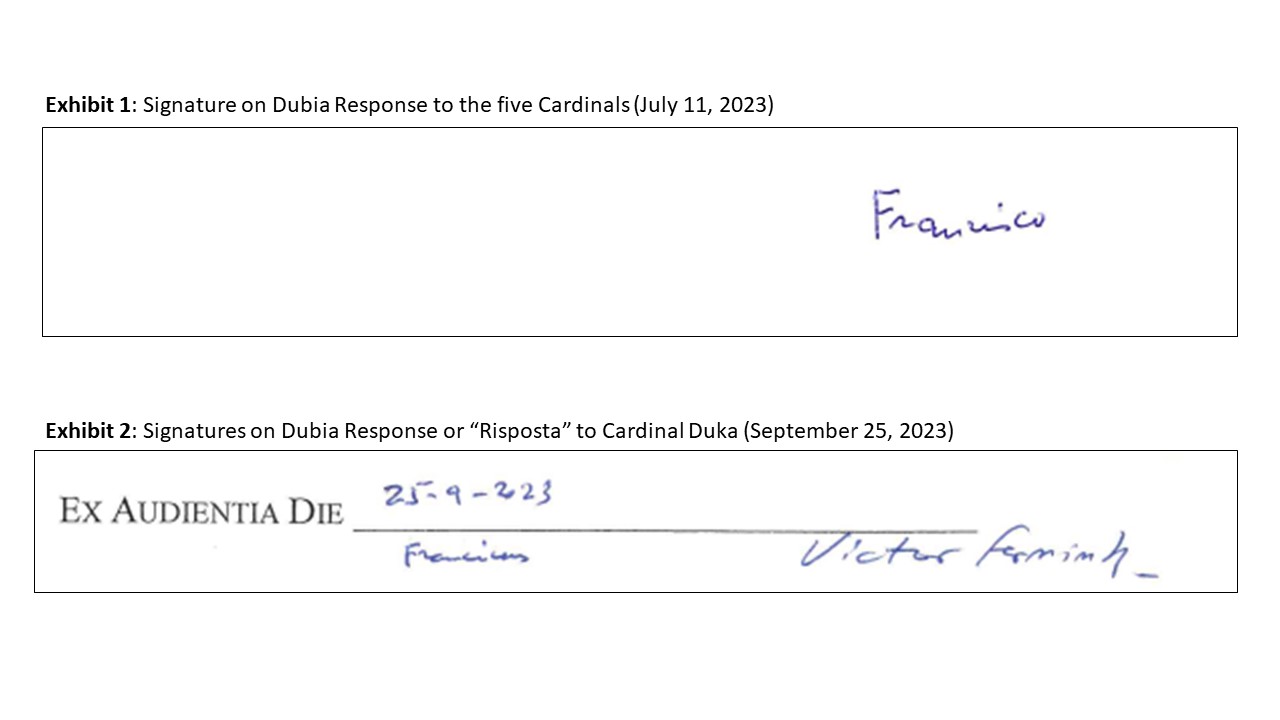- Feb 5, 2002
- 166,683
- 56,301
- Country
- United States
- Faith
- Catholic
- Marital Status
- Married
- Politics
- US-Others
October 13, 2023 (Steven O’Reilly) – In a recent article, Roma Locuta Est took a brief look at the two sets of dubia presented by a group of five cardinals, and the response to them by Cardinal Fernandez (see A New Set of Dubia: This time, a different Outcome?).
As outlined in my prior article, I commended the five cardinals for submitting these new Dubia to Pope Francis, and resubmitting them again in the face of clearly ambiguous answers (see HERE). At the time I wrote that we had these five new Dubia. However, since the publication of these aforementioned, an additional ten Dubia related to Amoris Laetitia submitted by Cardinal Duka were made public, as well as the answers to these ten by the Prefect of the DDF, Cardinal Fernandez (see HERE).
Yet, news is developing fast. Now, we learn via Sandro Magister that Cardinal Müller has published an open letter to Cardinal Duka which critically examines the response or “Riposta” Cardinal Duka received to his Dubia from Cardinal Fernandez (and Pope Francis). Magister’s article, and the text of Cardinal Muller’s response may be found on Magister’s site (see Your Eminence, dear brother Dominik Cardinal Duka). I definitely recommend that readers take their own look at Cardinal Müller’s letter, and his excellent analysis of the DDF response received by Cardinal Duka. We do observe that this Cardinal vs. Cardinal dispute erupts in public on October 13, 2023; the anniversary of the the last apparition at Fatima, Portugal in 2017, and the Miracle of the Sun.
First, Müller notes that Cardinal Fernandez’s response (“Risposta“) to one of Cardinal Duka’s Dubium “which allows access to the sacraments of Confession and of the Eucharist to divorced persons who have entered into a second civil union, even when they continue to behave as husband and wife with no intention of changing their lives.” Further, noting Fernandez’s “Risposta” affirms the Buenos Aires Guidelines, entered into the Acta Apostolicae Sedis,” is owed “religious submission of mind and will” (Lumen Gentium 25:1); Müller explores a proper understanding of “religious submission of mind and will.”
Again, I point the reader to his letter, but note here his statement that “Any form of magisterial positivism is also contrary to the Catholic Faith, since the Magisterium cannot teach what has nothing to do with Revelation, nor what is explicitly contrary to Sacred Scripture (“norma normans non normata”), the Apostolic Tradition, and the previous definitive decisions of the Magisterium itself (“Dei Verbum” 10; cf. DH 3116-3117).”
Müller poses the question “Is it necessary that we adhere with a religious assent to the text of Buenos Aires?” which he answers as follows (emphasis added):
Continued below.

 romalocutaest.com
romalocutaest.com
As outlined in my prior article, I commended the five cardinals for submitting these new Dubia to Pope Francis, and resubmitting them again in the face of clearly ambiguous answers (see HERE). At the time I wrote that we had these five new Dubia. However, since the publication of these aforementioned, an additional ten Dubia related to Amoris Laetitia submitted by Cardinal Duka were made public, as well as the answers to these ten by the Prefect of the DDF, Cardinal Fernandez (see HERE).
Yet, news is developing fast. Now, we learn via Sandro Magister that Cardinal Müller has published an open letter to Cardinal Duka which critically examines the response or “Riposta” Cardinal Duka received to his Dubia from Cardinal Fernandez (and Pope Francis). Magister’s article, and the text of Cardinal Muller’s response may be found on Magister’s site (see Your Eminence, dear brother Dominik Cardinal Duka). I definitely recommend that readers take their own look at Cardinal Müller’s letter, and his excellent analysis of the DDF response received by Cardinal Duka. We do observe that this Cardinal vs. Cardinal dispute erupts in public on October 13, 2023; the anniversary of the the last apparition at Fatima, Portugal in 2017, and the Miracle of the Sun.
First, Müller notes that Cardinal Fernandez’s response (“Risposta“) to one of Cardinal Duka’s Dubium “which allows access to the sacraments of Confession and of the Eucharist to divorced persons who have entered into a second civil union, even when they continue to behave as husband and wife with no intention of changing their lives.” Further, noting Fernandez’s “Risposta” affirms the Buenos Aires Guidelines, entered into the Acta Apostolicae Sedis,” is owed “religious submission of mind and will” (Lumen Gentium 25:1); Müller explores a proper understanding of “religious submission of mind and will.”
Again, I point the reader to his letter, but note here his statement that “Any form of magisterial positivism is also contrary to the Catholic Faith, since the Magisterium cannot teach what has nothing to do with Revelation, nor what is explicitly contrary to Sacred Scripture (“norma normans non normata”), the Apostolic Tradition, and the previous definitive decisions of the Magisterium itself (“Dei Verbum” 10; cf. DH 3116-3117).”
Müller poses the question “Is it necessary that we adhere with a religious assent to the text of Buenos Aires?” which he answers as follows (emphasis added):
Continued below.

Dubium: ‘Are you a heretic, yes or no?’
October 13, 2023 (Steven O’Reilly) – In a recent article, Roma Locuta Est took a brief look at the two sets of dubia presented by a group of five cardinals, and the response to them by …
 romalocutaest.com
romalocutaest.com
